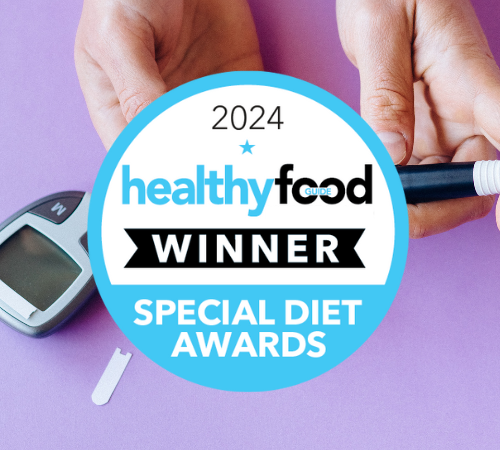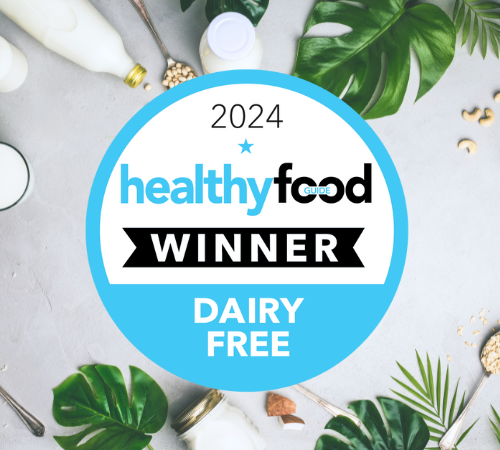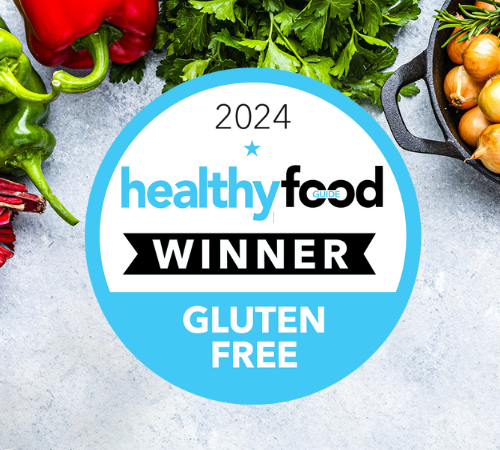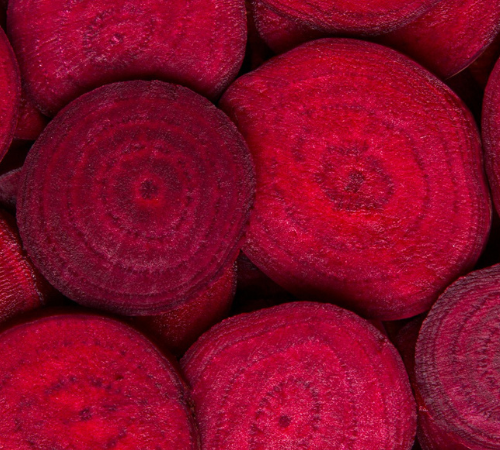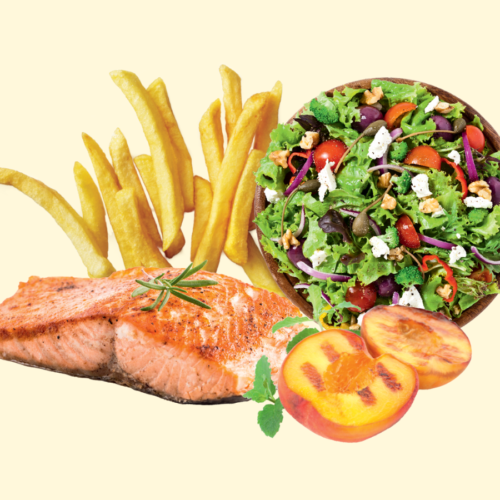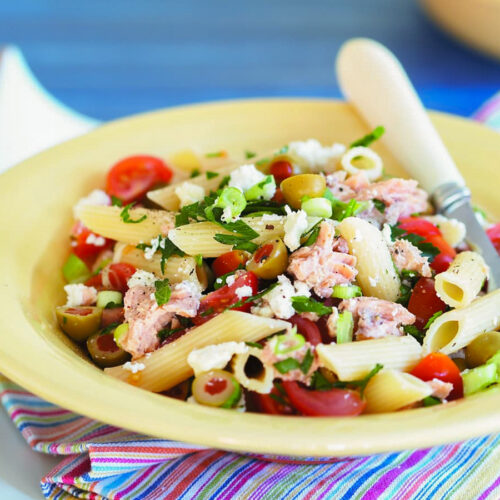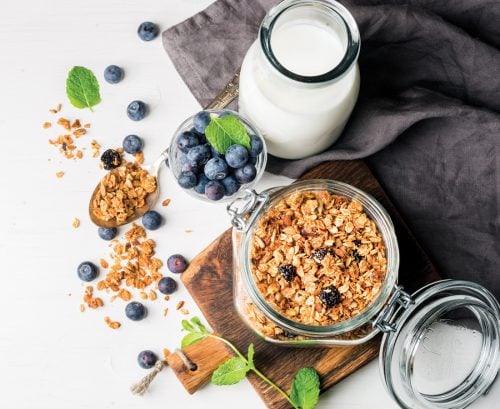
Starting the day with a good breakfast means you’ve got the energy to tackle your day, regardless of what it brings for you.
Many of us enjoy a bowl of muesli for breakfast. Here’s how you can easily boost your breakfast for a bigger nutrition hit.
Basic brekkie:
½ cup of a regular toasted muesli with oats and dried fruit, with 1 cup (250ml) trim milk.
Nutrition: 1550kJ(370cal), 16g protein, 10g fat, 2g sat fat, 50g carbs, 28g sugars, 7g fibre, 360mg calcium, 2mg iron
Our upgraded brekkie:
½ cup of a regular toasted muesli with oats and dried fruit, ½ cup calcium-fortified trim milk, ½ cup high-protein (Greek-style) yoghurt, 2 teaspoons each of chia, pumpkin and sunflower seeds, 1 kiwifruit and ¹⁄³ cup blueberries.
Nutrition: 2420kJ(577cal), 28g protein, 20g fat, 4g sat fat, 65g carbs, 38g sugars, 14g fibre, 620mg calcium, 3.5mg iron along with 67mg vitamin C and 70mg anthocyanins.
That’ll keep us going!
Upgrades:
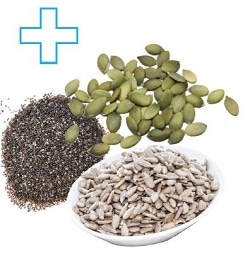
More fibre
Fibre helps fill us up for longer. It’s also great for our digestive health.
Add 2 teaspoons each of chia, pumpkin and sunflower seeds and you’ll add an extra 3.4g towards your suggested dietary target (SDT ) of 28g of fibre for women and 38g for men.
Bonus: This adds 4g protein too.
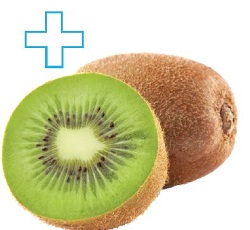
More vitamin C
Vitamin C helps boost our immune system and can help our body use dietary iron more efficiently.
Adding 1 kiwifruit to your muesli adds 63mg of vitamin C, which is around one-third of the SDT of 220mg for men and 190mg for women.
Bonus: This also adds 2.2g fibre.
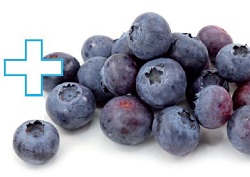
More antioxidants
There are no recommendations for the amount of antioxidants we need to be eating each day. But a higher intake has been associated with helping our immune system work properly and preventing cell damage, which can help prevent chronic conditions such as heart disease and cancer.
Adding ¹/³ cup blueberries provides 70mg anthocyanins, which are powerful antioxidants. To put this amount into perspective, a typical American has an intake of just 11.6mg a day.
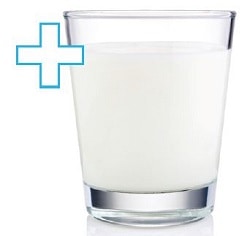
More calcium
Calcium is important for bone strength in growing children and to prevent bone mass loss as we get older. It’s also needed to keep our heart working properly.
Swapping a cup of trim milk for a calcium-fortified trim milk boosts the calcium contribution from 330mg to 500mg. It’s recommended adults have 1000mg calcium daily increasing to 1300mg for women 50-plus and men 70-plus.
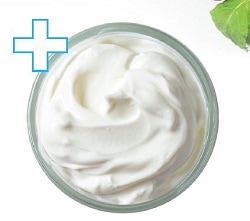
More protein
Higher-protein foods can help us feel full and provide the building blocks for many hormones and muscle fibres.
Swap some of the milk for a high-protein yoghurt and add an extra 5g protein per ½ cup.
Bonus: The yoghurt is just as high in calcium as the calcium-fortified milk so you can do a full swap, if you prefer.
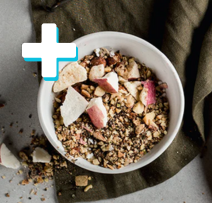
Taste toppers
Add a little extra flavour with sliced banana, or a handful of apple crumble mix.
Article sources and references
- National Health and Medical Research Council and Ministry of Health. Nutrient Reference Values for Australia and New Zealand, nrv.gov.au/home Accessed April 2019https://www.nrv.gov.au/
- National Health and Medical Research Council and Ministry of Health. Recommendations to Reduce Chronic Disease Risk, nrv.gov.au/chronic-disease/ summary Accessed April 2019https://www.nrv.gov.au/chronic-disease/summary
- Stevenson D & Scalzo J. 2012. Anthocyanin composition and content of blueberries from around the world. Journal of Berry Research 2:179-89https://content.iospress.com/download/journal-of-berry-research/jbr038?id=journal-of-berry-research%2Fjbr038
- Wallace TC & Giusti MM. 2015. Anthocyanins. Advances in Nutrition. 6:620-2https://academic.oup.com/advances/article/6/5/620/4616693
www.healthyfood.com


